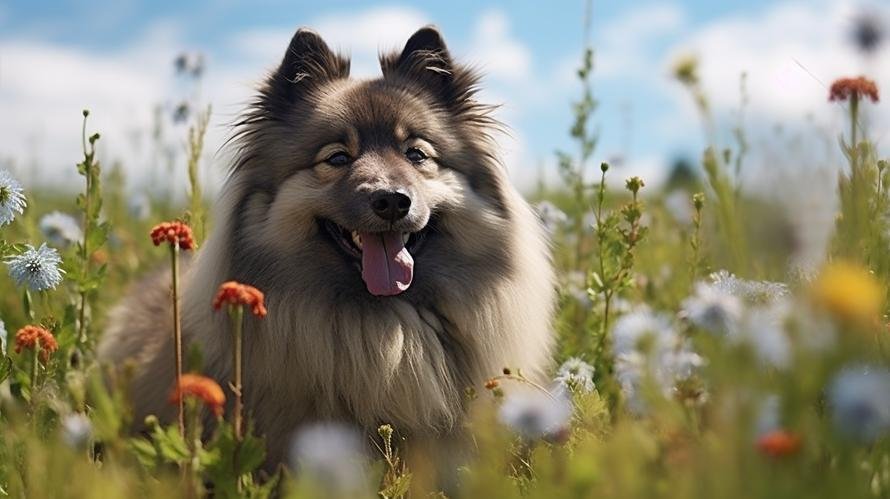When we think about nutrition and diet, we often consider our own health first, but what about our four-legged companions? Have you ever thought about what your Keeshond is munching on in their bowl and how it affects their health? If you’re a curious Keeshond owner, you might be surprised to learn that this specific breed has unique nutritional needs that set them apart from other canines.
The Keeshond, pronounced “kayz-hawnd”, is a medium-sized dog breed from the Spitz family, which also includes the likes as the Siberian Husky and the Alaskan Malamute. Originally hailing from the Netherlands, these fluffy dogs have a double coat and are known for their friendly, outgoing, and even temperament. But did you also know that they come with unique dietary needs as well?
Let’s embark on a journey of culinary discovery to better understand the unique dietary needs of this particular breed. Let’s dive deep into the world of dog nutrition and figure out what’s on the menu for a Keeshond.
Keeshonds Need Balanced Nutrition
Like humans, Keeshonds thrive on a balanced diet. A healthy meal for a Keeshond must yield the right balance of proteins, fats, carbohydrates, vitamins, and minerals. Animal proteins are of utmost importance as they supply the nine essential amino acids that dogs cannot produce themselves.
A diet rich in proteins supports muscle health, growth, and tissue repair. Healthy fats help maintain their thick, fluffy coat, keep it shiny, and are essential for normal physiological functions. Carbohydrates serve as the primary source of energy, while minerals and vitamins are vital for various bodily processes.
Many commercial dog foods promise balanced nutrition, but not all are equal. Some are geared towards specific life stages—puppy, adult, senior—while others cater to health conditions. However, when it comes to Keeshonds, what’s the ideal food?
A One-Size-Fits-All Approach Doesn’t Work
Just as it is with humans, every dog is unique, and a one-size-fits-all approach doesn’t work. Food that works well for a Chihuahua might not be the best for a St.Bernard, likewise for a Keeshond. Specifically, for Keeshonds, their active lifestyle and history of certain health conditions necessitate a particular focus on their diet.
Keeshonds are characterized by their robust energy levels and need a diet that keeps up with their active lifestyles. As they tend to burn calories at a high rate, it’s crucial that their diet is packed with nutritious, energy-rich food. Care must also be taken to consider any inherent health problems associated with the breed. Keeshonds, for instance, are prone to heart diseases and hip dysplasia. Therefore, a diet that promotes heart health and joint strength is highly beneficial to them.
Deciphering Dog Food Labels
The best way to determine the right diet for your Keeshond is by first understanding dog food labels. Words like ‘premium’, ‘balanced’, ‘complete’, and ‘natural’ might sound appealing, but they don’t always deliver nutrition-wise. Instead, key things to look out for include the nutritional adequacy statement, the purpose of the dog food, its ingredients, and guarantees about proportions of nutrients like protein and fat.
Fresh Home-Cooked Meals for Your Keeshond
Apart from commercial dog food, fresh home-cooked meals could be beneficial for your Keeshond. Simple recipes with high-quality meat as the primary ingredient, combined with whole grains and vegetables, can offer a wholesome meal. Foods rich in omega-3 fatty acids, antioxidants, and dietary fiber can keep their coat radiant and their hearts healthy.
Alternatively, many companies offer fresh, human-grade food specifically formulated for dogs. These meals are free from preservatives, additives, and artificial colors, ensuring your Keeshond gets only the best.
Catering to Keeshond-Specific Needs
While wholesome nutrition is crucial for all dogs, Keeshonds need some specific ingredients in their food. Foods rich in Coenzyme Q10, Taurine, L-carnitine, and omega-3 fatty acids such as fish oils, can support heart health. These are especially vital for Keeshonds due to their susceptibility to heart conditions. Additionally, foods fortified with chondroitin and glucosamine help promote joint health and lubrication, providing some relief from issues like hip dysplasia.
Maintaining a Healthy Weight
Given their active nature, it’s easy for a Keeshond to shed off a couple of pounds. Nevertheless, keeping an eye on their weight is essential. Obesity can strain their hearts and joints, exacerbating health issues. On the other hand, underweight Keeshonds may lack the necessary nutrients to be healthy and may reflect a dietary problem or a health condition.
In conclusion, the best food for a Keeshond would be a diet that provides holistic nutrition, tailored to their unique dietary needs and potential health conditions. Steer clear of high-grain and carbohydrate-fillers used in some commercial dog foods, and be on the lookout for high-quality proteins, heart-friendly ingredients, and joint-supportive nutrients.
Pair this dietary plan with an active lifestyle, regular vet check-ups, and a lot of love, and you’ll be on your way to ensuring your Keeshond lives a long, vibrant life. After all, good food equals good health, and your furry companion deserves nothing less!



